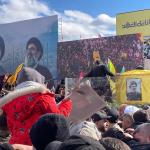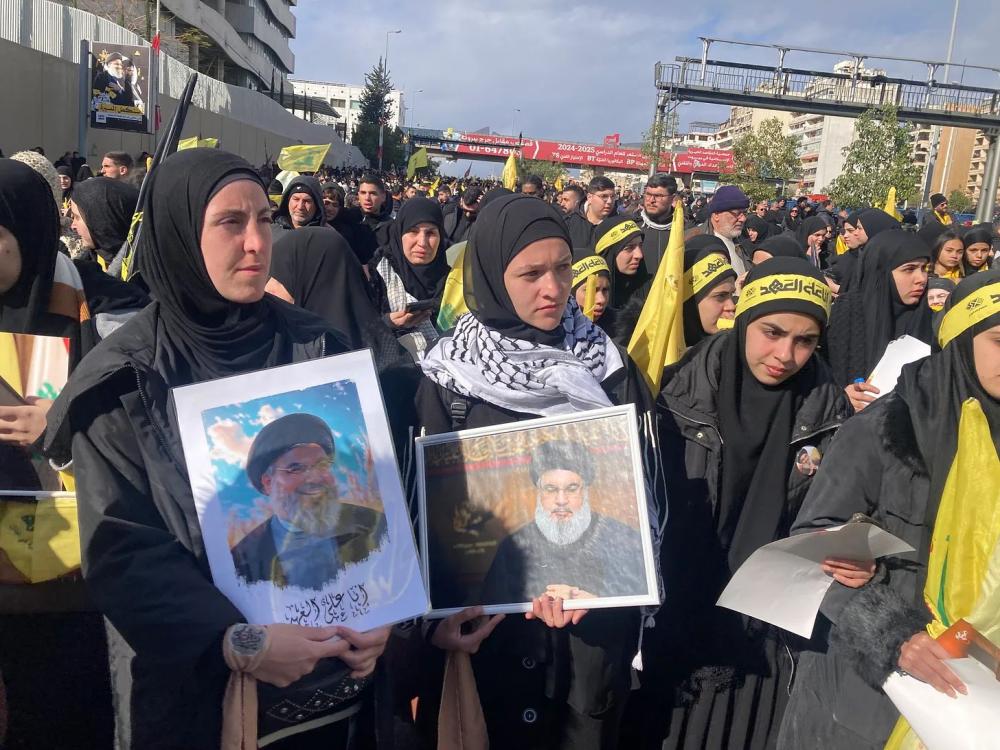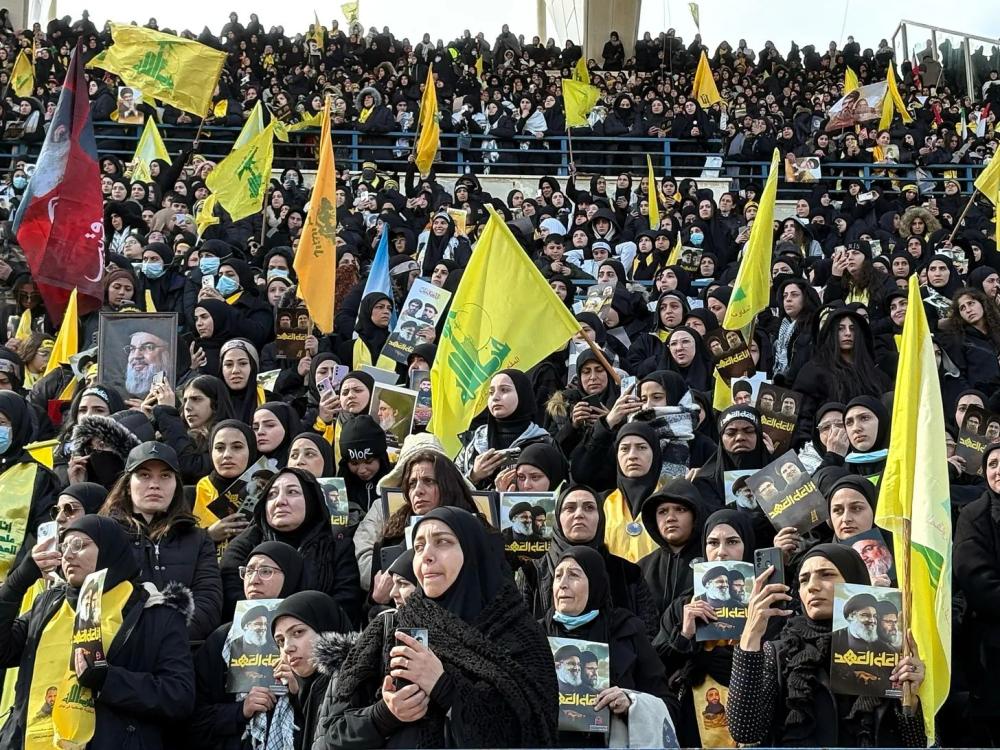The Funeral of Hezbollah Leader Hassan Nasrallah

BEIRUT, Lebanon—Hundreds of thousands of people filled the streets of Beirut and packed into a stadium on Sunday for the funeral of former Hezbollah Secretary General Hassan Nasrallah. One of the most prominent Arab leaders of his generation, Nasrallah was killed on September 27 when Israel dropped more than eighty tons of munitions on a residential compound in Beirut’s southern suburb of Dahiyeh as he was meeting with senior Hezbollah officials in an underground bunker. The massive strike also killed an unknown number of civilians.
The enormous crowds on Sunday were a clear assertion of support and presence for Hezbollah, which suffered heavy losses in Israel’s war on Lebanon, including Nasrallah—its leader of more than 30 years—as well as many of the group’s top commanders and much of its rank and file. The funeral ceremony also included Nasrallah’s cousin and successor, Hashem Safieddine, who was killed in an Israeli airstrike a few days later.
Mourners streamed in from Hezbollah’s strongholds in southern Lebanon on Saturday—traveling north to Beirut by car, on foot, and even on horseback to take part in the funeral. Large billboards bearing images of a smiling Nasrallah next to Safieddine with slogans like “We are not defeated” stand high all along Lebanon’s coastal highway.
Security measures were put in place for the ceremony, including shutting down Beirut airport and closing down major roads in the capital. Huge screens were set up on the roads leading to the site for the crowds who were not able to make it into the stadium, which was full to capacity. Large delegations of supporters from Iran, Yemen, Iraq, and other countries in the region mixed in with the crowds.
Nasrallah and Safieddine were temporarily buried in secret graves after they were killed nearly five months ago, with Hezbollah unable to hold a public funeral while the war was raging. A 60-day ceasefire agreement between Israel and Lebanon went into effect on November 26, with Israel violating the deal hundreds of times, including extending the deadline for a withdrawal of its troops on January 26 to February 18, when they finally pulled back from villages in the south, but remain illegally occupying five hilltop locations inside Lebanon.
“Nasrallah's path will be completed even if our homes are destroyed over our heads and we are all killed," Hezbollah’s current Secretary General Naim Qassem said during the funeral ceremony in a televised speech. "The resistance is present and strong in numbers and capabilities, and the inevitable victory is coming, and Israel must withdraw from the areas it still occupies.”
Israel continued to violate the ceasefire on Sunday, bombing several locations in southern Lebanon. In the middle of the funeral ceremony, four Israeli fighter jets flew low over the stadium with a deafening noise, prompting the crowd to chant louder, “Death to Israel. Death to the United States.”

Mourners on the streets of Beirut during the funeral procession of Hezbollah leader Hassan Nasrallah. February 23, 2025. (Photo by Sharif Abdel Kouddous)
Shortly afterwards, Nasrallah’s coffin, draped in yellow, was brought out into the stadium, alongside Saffiedine’s, on a large semi-trailer truck converted into a funeral hearse which made a slow loop around the track. Men and women wept openly and chanted slogans of support as Hezbollah officials standing alongside the coffins—including Nasrallah’s long time bodyguard Abu Ali—tossed flowers to the wailing crowd below.
“To us, he was not just the secretary general of Hezbollah, he was our father,” said Fatima, who came from southern Lebanon to attend the ceremony. “He held the nation in his embrace. He defended not just Lebanon, he defended Palestine, Iraq, Yemen, he defended all the oppressed.”
Under Nasrallah’s leadership, Hezbollah grew from a militia into one of the most powerful political movements in the Arab world and a formidable fighting force in the region. A charismatic speaker, Nasrallah was widely recognized as an anti-colonial figure, an outspoken advocate of the Palestinian cause, and a leading figure in the Axis of Resistance—the loose coalition of both nation-states and non-state actors in the Middle East who pledged to jointly oppose Israel.
Hezbollah’s status in the region soared after the 2006 war, which was seen as a victory over Israel. But when Nasrallah intervened in the Syrian civil war on the side of former President Bashar al-Assad, it damaged the group’s standing, spurring intense divisions among Hezbollah’s broader base of support in the region between those who supported Assad and those who opposed his regime.
As a juggernaut in Lebanese politics, Hezbollah also worked to suppress popular protests that broke out across Lebanon in October 2019 that demanded an end to sectarianism and corruption framed by the chant: “All of them means all of them”—which included Hezbollah.
Nonetheless, when Israel began its genocidal assault on Gaza on October 7, 2023, Hezbollah opened what it called a “front of support” for Hamas and began firing rockets and artillery at Israeli forces, while every other Arab nation except Yemen largely stood by. Israel retaliated by bombing Lebanon, mostly in the south. The cross border attacks continued for nearly a year before Israel escalated the war in September, detonating hundreds of beepers and walkie talkies belonging to Hezbollah members, killing dozens of civilians and injuring almost 3,500. A few days later, Israel launched Operation Northern Arrows, dramatically intensifying its aerial bombardment and launching a ground invasion—killing over 4,000 people and forcing more than 1.2 million to flee their homes.
The killing of Nasrallah in September caused shockwaves throughout Lebanon and the region. Hezbollah’s opponents inside Lebanon and internationally have been seeking to further weaken the group and replace it as the most powerful force in the country. The Trump administration demanded that Hezbollah be barred from the newly reconfigured Lebanese government. On a visit to Lebanon earlier this month, U.S. Deputy Middle East Envoy Morgan Ortagus said, “We are grateful to our ally Israel for defeating Hezbollah.” She added: "And we have set clear red lines from the United States that they won't be able to terrorize the Lebanese people, and that includes by being a part of the government.”

Mourners at the funeral ceremony of Hezbollah leader Hassan Nasrallah. February 23, 2025. (Photo by Lama al-Arian)
Today’s funeral was not only a display of mourning but also a show of strength by Hezbollah as it continues to assert itself as a major player in the political and military landscape of Lebanon without Nasrallah as its leader.
“He was our father,” Dalia, a mourner from southern Lebanon, said, echoing a common refrain. “We listened to every single speech he ever gave. When he would appear we would feel comforted. He was our morphine.”
Lama al-Arian contributed to this report.
[Moderator - also of interest: Illusions of Containment by Tom Stevenson, London Review of Books, February 6, 2025
Sharif Abdel Kouddous is a journalist and editor at Drop Site News.
Independent news on politics and war. Founded by Ryan Grim, Jeremy Scahill, and veterans of The Intercept.
Investigative journalism lives on.
Gaza is under siege. Ukraine is starting to use U.S. weapons inside of Russia. India is assassinating its leader’s political enemies around the world. The U.S. election has left the American people to choose between Donald Trump, who uses the term Palestinian as a slur, and Kamala Harris, who has done little to separate herself from the genocidal policy of the administration in which she serves.
Free speech is under unprecedented assault from corporate and government forces. Far right movements are surging in Europe and beyond. A militant new labor movement is on the march here in the United States, but a corporate backlash is brewing.
At a time when the world desperately needs hard-hitting journalism, establishment and corporate media outlets are failing the public and democracy itself. That’s why Jeremy Scahill and Ryan Grim started Drop Site, a non-aligned, investigative news organization dedicated to exposing the crimes of the powerful — particularly in overt and secret conflicts where the U.S. government is playing a key role.
Drop Site is not simply another non-partisan news organization. It is completely independent journalism dedicated to principles of accuracy and accountability. We are never afraid to take a stand for truth, regardless of the partisan consequences or the risk of political or personal unpopularity.
Drop Site is reader-supported. Consider becoming a free or paid subscriber.
Investigative journalism is expensive. Even if we were willing to take corporate ads – which we’re not – digital ad revenue alone can’t sustain the slow boring of investigative work. It can only be supported by people who insist that it exist.
Our work will always remain free to the public, but we have certain features you can only access as a subscriber, like AMAs and invitations to virtual and in-person discussions with our journalists and newsmakers.
We also limit the ability to comment to paid subscribers and donors of any amount, primarily as a way to keep trolls out of the commenting community. If you can’t afford to donate but really want to be able to comment, and promise not to be a troll, email contact@dropsitenews.com for a special dispensation. (Please don’t make us regret it. We don’t want to have to spend our time moderating flame wars, but we do want to create a space where people can debate the issues raised by our reporting.)
Even if you don’t end up donating or becoming a paying subscriber, your act of joining this list goes a long way to support independent journalism, giving us the reach we need for our work to have impact.
